Climate Change and the Welfare State: Exploring Australian Attitudes to Climate and Social Policy
VerifiedAdded on 2023/06/03
|10
|2501
|345
AI Summary
This article explores the connection between climate change and social policy in Australia. It analyzes the recent mobilization towards climate action and the bonding between approaches to social and ecological defense. The key concepts involved are climate policy, social policy, and the welfare state. The article uses primary research to gather information and includes a regression model to examine the relationship between climate change and social policy. The report discusses the factors considered in translating the journal article for lay audiences, the medium used, and the role of visual material.
Contribute Materials
Your contribution can guide someone’s learning journey. Share your
documents today.

Interdisciplinary Leadership
Secure Best Marks with AI Grader
Need help grading? Try our AI Grader for instant feedback on your assignments.
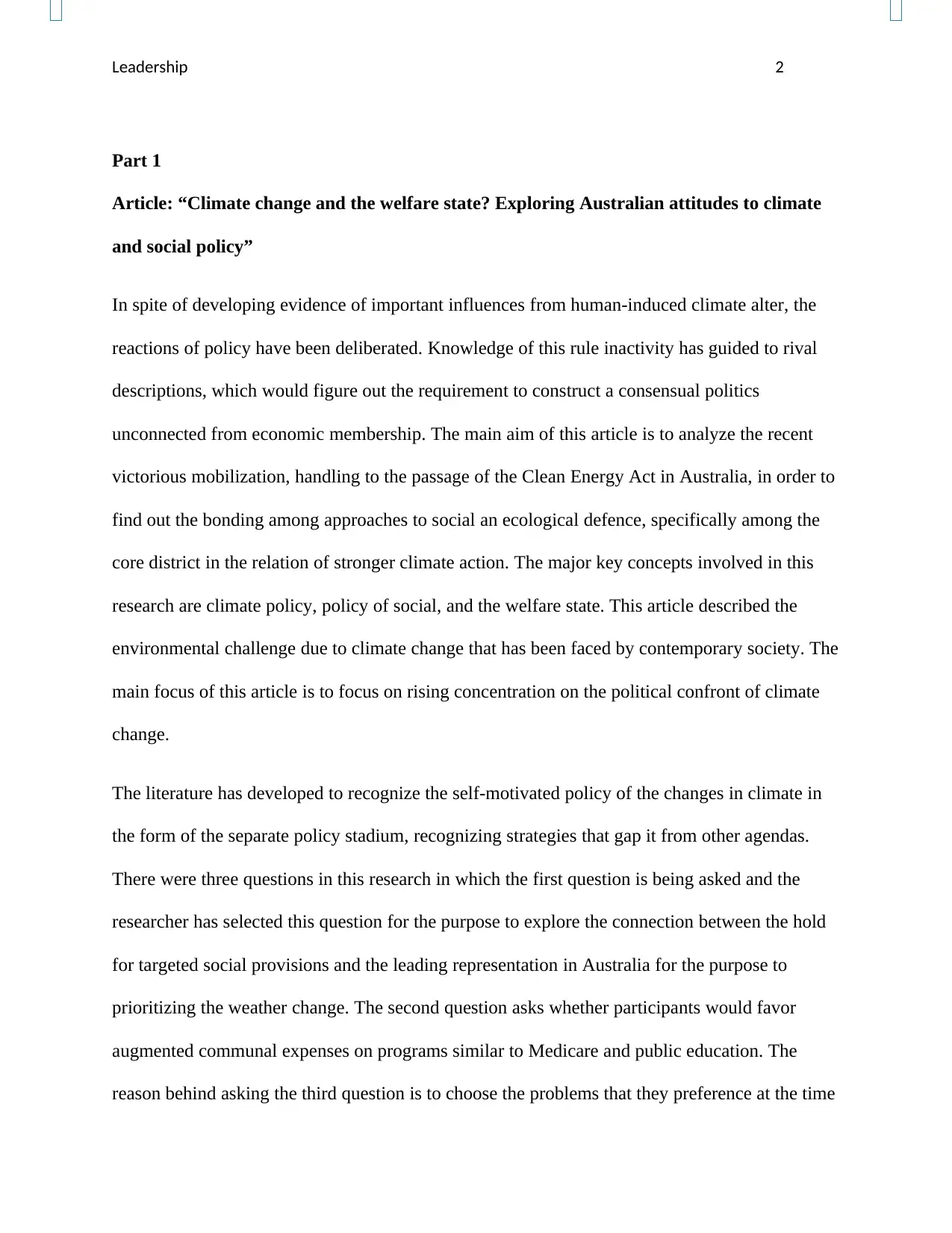
Leadership 2
Part 1
Article: “Climate change and the welfare state? Exploring Australian attitudes to climate
and social policy”
In spite of developing evidence of important influences from human-induced climate alter, the
reactions of policy have been deliberated. Knowledge of this rule inactivity has guided to rival
descriptions, which would figure out the requirement to construct a consensual politics
unconnected from economic membership. The main aim of this article is to analyze the recent
victorious mobilization, handling to the passage of the Clean Energy Act in Australia, in order to
find out the bonding among approaches to social an ecological defence, specifically among the
core district in the relation of stronger climate action. The major key concepts involved in this
research are climate policy, policy of social, and the welfare state. This article described the
environmental challenge due to climate change that has been faced by contemporary society. The
main focus of this article is to focus on rising concentration on the political confront of climate
change.
The literature has developed to recognize the self-motivated policy of the changes in climate in
the form of the separate policy stadium, recognizing strategies that gap it from other agendas.
There were three questions in this research in which the first question is being asked and the
researcher has selected this question for the purpose to explore the connection between the hold
for targeted social provisions and the leading representation in Australia for the purpose to
prioritizing the weather change. The second question asks whether participants would favor
augmented communal expenses on programs similar to Medicare and public education. The
reason behind asking the third question is to choose the problems that they preference at the time
Part 1
Article: “Climate change and the welfare state? Exploring Australian attitudes to climate
and social policy”
In spite of developing evidence of important influences from human-induced climate alter, the
reactions of policy have been deliberated. Knowledge of this rule inactivity has guided to rival
descriptions, which would figure out the requirement to construct a consensual politics
unconnected from economic membership. The main aim of this article is to analyze the recent
victorious mobilization, handling to the passage of the Clean Energy Act in Australia, in order to
find out the bonding among approaches to social an ecological defence, specifically among the
core district in the relation of stronger climate action. The major key concepts involved in this
research are climate policy, policy of social, and the welfare state. This article described the
environmental challenge due to climate change that has been faced by contemporary society. The
main focus of this article is to focus on rising concentration on the political confront of climate
change.
The literature has developed to recognize the self-motivated policy of the changes in climate in
the form of the separate policy stadium, recognizing strategies that gap it from other agendas.
There were three questions in this research in which the first question is being asked and the
researcher has selected this question for the purpose to explore the connection between the hold
for targeted social provisions and the leading representation in Australia for the purpose to
prioritizing the weather change. The second question asks whether participants would favor
augmented communal expenses on programs similar to Medicare and public education. The
reason behind asking the third question is to choose the problems that they preference at the time
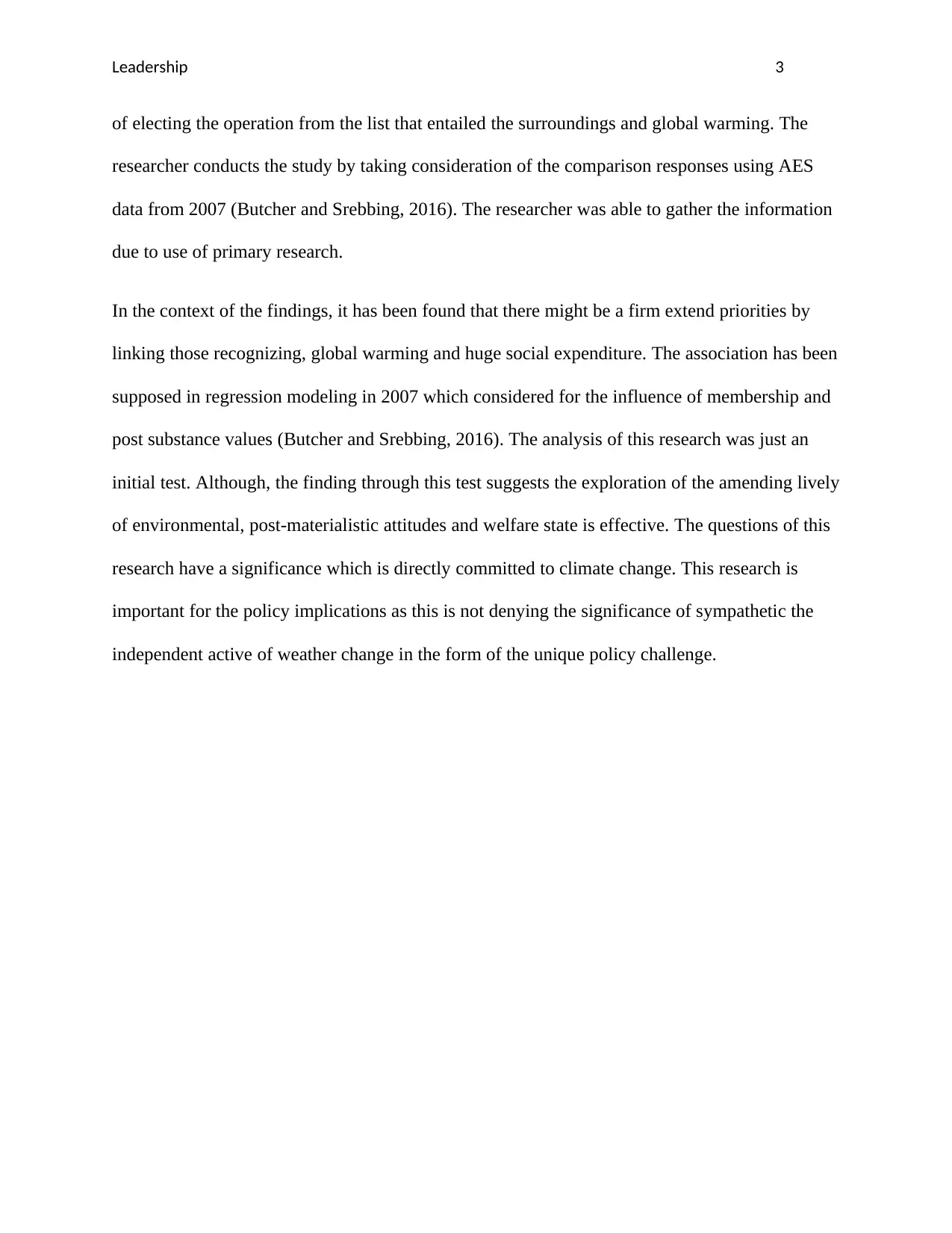
Leadership 3
of electing the operation from the list that entailed the surroundings and global warming. The
researcher conducts the study by taking consideration of the comparison responses using AES
data from 2007 (Butcher and Srebbing, 2016). The researcher was able to gather the information
due to use of primary research.
In the context of the findings, it has been found that there might be a firm extend priorities by
linking those recognizing, global warming and huge social expenditure. The association has been
supposed in regression modeling in 2007 which considered for the influence of membership and
post substance values (Butcher and Srebbing, 2016). The analysis of this research was just an
initial test. Although, the finding through this test suggests the exploration of the amending lively
of environmental, post-materialistic attitudes and welfare state is effective. The questions of this
research have a significance which is directly committed to climate change. This research is
important for the policy implications as this is not denying the significance of sympathetic the
independent active of weather change in the form of the unique policy challenge.
of electing the operation from the list that entailed the surroundings and global warming. The
researcher conducts the study by taking consideration of the comparison responses using AES
data from 2007 (Butcher and Srebbing, 2016). The researcher was able to gather the information
due to use of primary research.
In the context of the findings, it has been found that there might be a firm extend priorities by
linking those recognizing, global warming and huge social expenditure. The association has been
supposed in regression modeling in 2007 which considered for the influence of membership and
post substance values (Butcher and Srebbing, 2016). The analysis of this research was just an
initial test. Although, the finding through this test suggests the exploration of the amending lively
of environmental, post-materialistic attitudes and welfare state is effective. The questions of this
research have a significance which is directly committed to climate change. This research is
important for the policy implications as this is not denying the significance of sympathetic the
independent active of weather change in the form of the unique policy challenge.
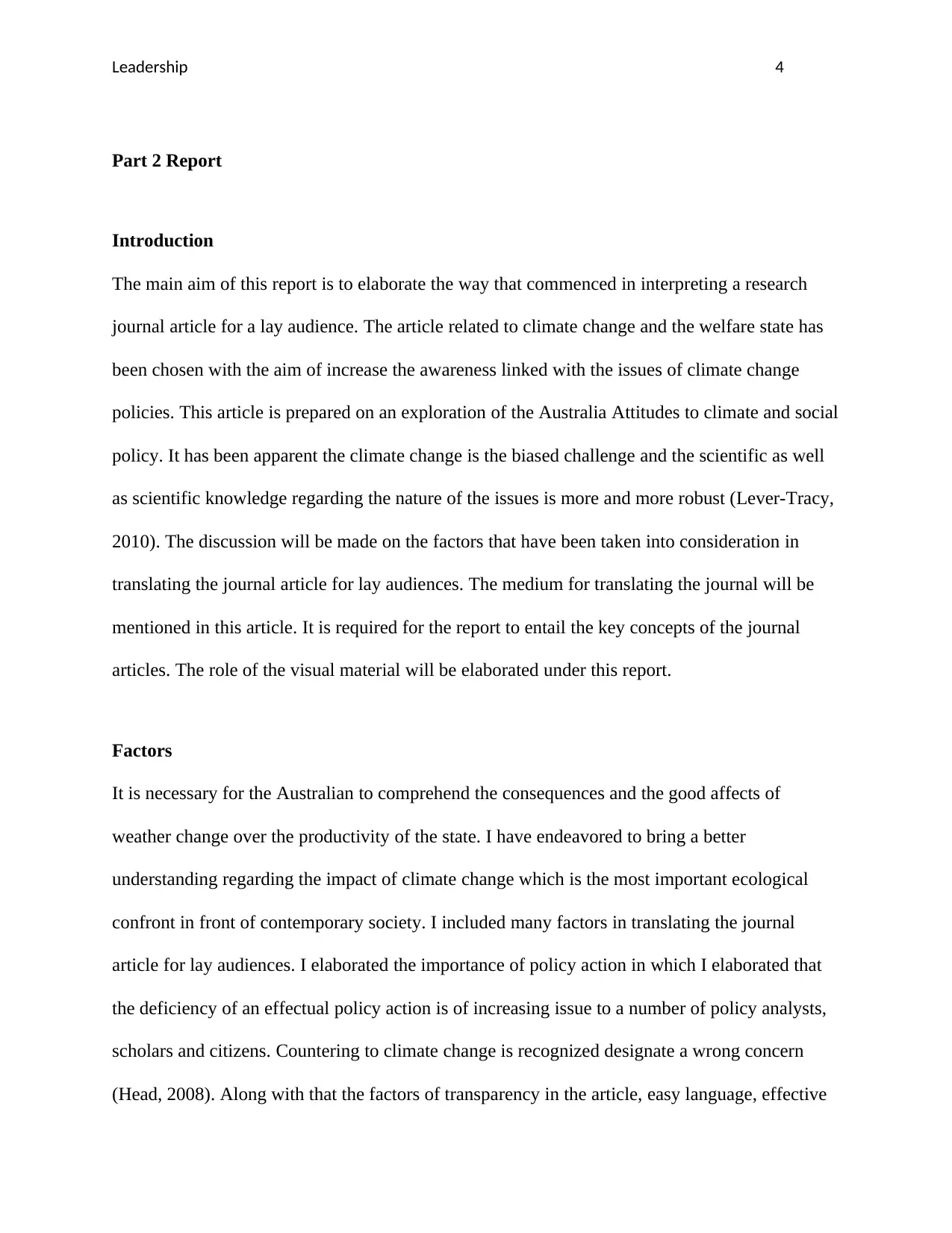
Leadership 4
Part 2 Report
Introduction
The main aim of this report is to elaborate the way that commenced in interpreting a research
journal article for a lay audience. The article related to climate change and the welfare state has
been chosen with the aim of increase the awareness linked with the issues of climate change
policies. This article is prepared on an exploration of the Australia Attitudes to climate and social
policy. It has been apparent the climate change is the biased challenge and the scientific as well
as scientific knowledge regarding the nature of the issues is more and more robust (Lever-Tracy,
2010). The discussion will be made on the factors that have been taken into consideration in
translating the journal article for lay audiences. The medium for translating the journal will be
mentioned in this article. It is required for the report to entail the key concepts of the journal
articles. The role of the visual material will be elaborated under this report.
Factors
It is necessary for the Australian to comprehend the consequences and the good affects of
weather change over the productivity of the state. I have endeavored to bring a better
understanding regarding the impact of climate change which is the most important ecological
confront in front of contemporary society. I included many factors in translating the journal
article for lay audiences. I elaborated the importance of policy action in which I elaborated that
the deficiency of an effectual policy action is of increasing issue to a number of policy analysts,
scholars and citizens. Countering to climate change is recognized designate a wrong concern
(Head, 2008). Along with that the factors of transparency in the article, easy language, effective
Part 2 Report
Introduction
The main aim of this report is to elaborate the way that commenced in interpreting a research
journal article for a lay audience. The article related to climate change and the welfare state has
been chosen with the aim of increase the awareness linked with the issues of climate change
policies. This article is prepared on an exploration of the Australia Attitudes to climate and social
policy. It has been apparent the climate change is the biased challenge and the scientific as well
as scientific knowledge regarding the nature of the issues is more and more robust (Lever-Tracy,
2010). The discussion will be made on the factors that have been taken into consideration in
translating the journal article for lay audiences. The medium for translating the journal will be
mentioned in this article. It is required for the report to entail the key concepts of the journal
articles. The role of the visual material will be elaborated under this report.
Factors
It is necessary for the Australian to comprehend the consequences and the good affects of
weather change over the productivity of the state. I have endeavored to bring a better
understanding regarding the impact of climate change which is the most important ecological
confront in front of contemporary society. I included many factors in translating the journal
article for lay audiences. I elaborated the importance of policy action in which I elaborated that
the deficiency of an effectual policy action is of increasing issue to a number of policy analysts,
scholars and citizens. Countering to climate change is recognized designate a wrong concern
(Head, 2008). Along with that the factors of transparency in the article, easy language, effective
Secure Best Marks with AI Grader
Need help grading? Try our AI Grader for instant feedback on your assignments.
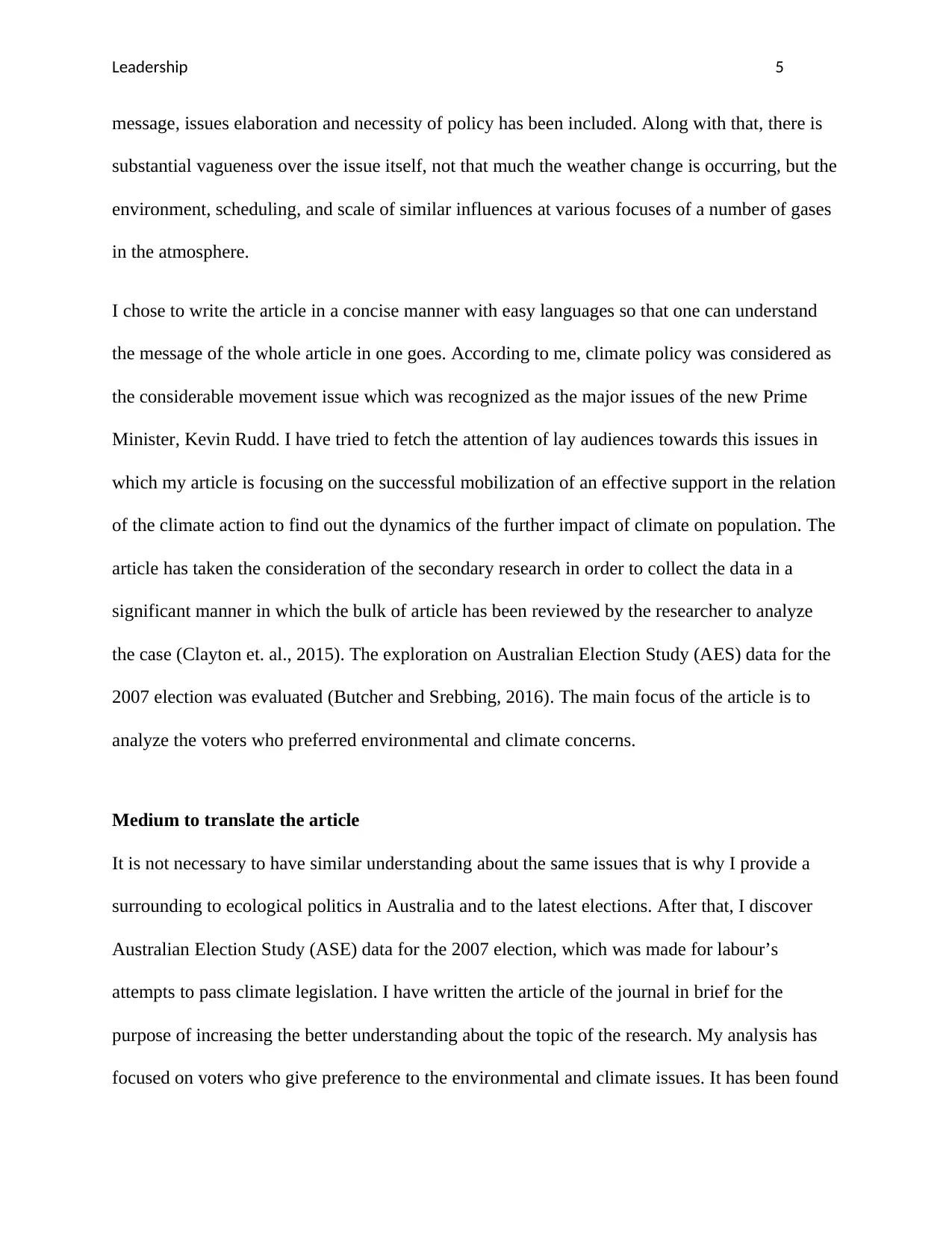
Leadership 5
message, issues elaboration and necessity of policy has been included. Along with that, there is
substantial vagueness over the issue itself, not that much the weather change is occurring, but the
environment, scheduling, and scale of similar influences at various focuses of a number of gases
in the atmosphere.
I chose to write the article in a concise manner with easy languages so that one can understand
the message of the whole article in one goes. According to me, climate policy was considered as
the considerable movement issue which was recognized as the major issues of the new Prime
Minister, Kevin Rudd. I have tried to fetch the attention of lay audiences towards this issues in
which my article is focusing on the successful mobilization of an effective support in the relation
of the climate action to find out the dynamics of the further impact of climate on population. The
article has taken the consideration of the secondary research in order to collect the data in a
significant manner in which the bulk of article has been reviewed by the researcher to analyze
the case (Clayton et. al., 2015). The exploration on Australian Election Study (AES) data for the
2007 election was evaluated (Butcher and Srebbing, 2016). The main focus of the article is to
analyze the voters who preferred environmental and climate concerns.
Medium to translate the article
It is not necessary to have similar understanding about the same issues that is why I provide a
surrounding to ecological politics in Australia and to the latest elections. After that, I discover
Australian Election Study (ASE) data for the 2007 election, which was made for labour’s
attempts to pass climate legislation. I have written the article of the journal in brief for the
purpose of increasing the better understanding about the topic of the research. My analysis has
focused on voters who give preference to the environmental and climate issues. It has been found
message, issues elaboration and necessity of policy has been included. Along with that, there is
substantial vagueness over the issue itself, not that much the weather change is occurring, but the
environment, scheduling, and scale of similar influences at various focuses of a number of gases
in the atmosphere.
I chose to write the article in a concise manner with easy languages so that one can understand
the message of the whole article in one goes. According to me, climate policy was considered as
the considerable movement issue which was recognized as the major issues of the new Prime
Minister, Kevin Rudd. I have tried to fetch the attention of lay audiences towards this issues in
which my article is focusing on the successful mobilization of an effective support in the relation
of the climate action to find out the dynamics of the further impact of climate on population. The
article has taken the consideration of the secondary research in order to collect the data in a
significant manner in which the bulk of article has been reviewed by the researcher to analyze
the case (Clayton et. al., 2015). The exploration on Australian Election Study (AES) data for the
2007 election was evaluated (Butcher and Srebbing, 2016). The main focus of the article is to
analyze the voters who preferred environmental and climate concerns.
Medium to translate the article
It is not necessary to have similar understanding about the same issues that is why I provide a
surrounding to ecological politics in Australia and to the latest elections. After that, I discover
Australian Election Study (ASE) data for the 2007 election, which was made for labour’s
attempts to pass climate legislation. I have written the article of the journal in brief for the
purpose of increasing the better understanding about the topic of the research. My analysis has
focused on voters who give preference to the environmental and climate issues. It has been found
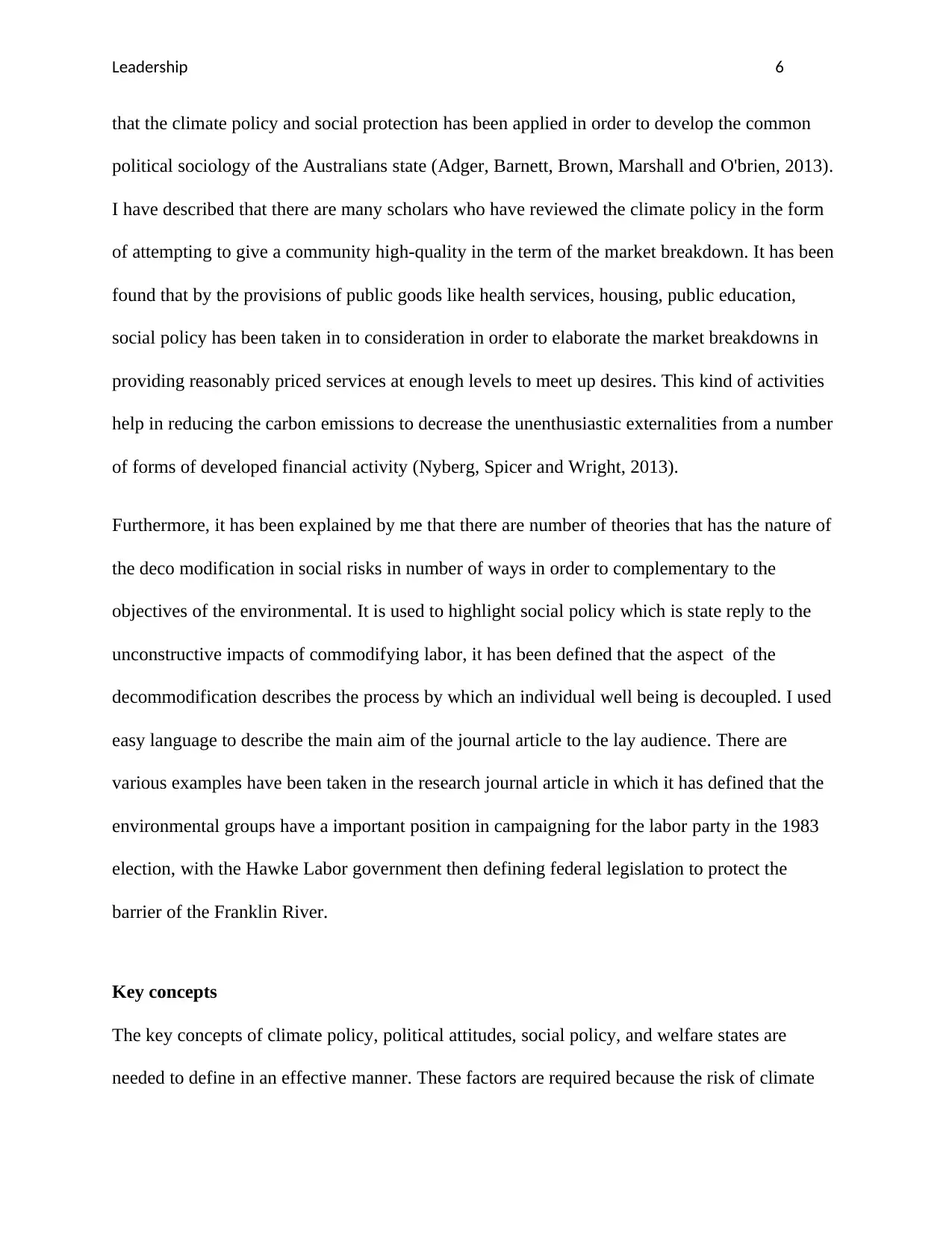
Leadership 6
that the climate policy and social protection has been applied in order to develop the common
political sociology of the Australians state (Adger, Barnett, Brown, Marshall and O'brien, 2013).
I have described that there are many scholars who have reviewed the climate policy in the form
of attempting to give a community high-quality in the term of the market breakdown. It has been
found that by the provisions of public goods like health services, housing, public education,
social policy has been taken in to consideration in order to elaborate the market breakdowns in
providing reasonably priced services at enough levels to meet up desires. This kind of activities
help in reducing the carbon emissions to decrease the unenthusiastic externalities from a number
of forms of developed financial activity (Nyberg, Spicer and Wright, 2013).
Furthermore, it has been explained by me that there are number of theories that has the nature of
the deco modification in social risks in number of ways in order to complementary to the
objectives of the environmental. It is used to highlight social policy which is state reply to the
unconstructive impacts of commodifying labor, it has been defined that the aspect of the
decommodification describes the process by which an individual well being is decoupled. I used
easy language to describe the main aim of the journal article to the lay audience. There are
various examples have been taken in the research journal article in which it has defined that the
environmental groups have a important position in campaigning for the labor party in the 1983
election, with the Hawke Labor government then defining federal legislation to protect the
barrier of the Franklin River.
Key concepts
The key concepts of climate policy, political attitudes, social policy, and welfare states are
needed to define in an effective manner. These factors are required because the risk of climate
that the climate policy and social protection has been applied in order to develop the common
political sociology of the Australians state (Adger, Barnett, Brown, Marshall and O'brien, 2013).
I have described that there are many scholars who have reviewed the climate policy in the form
of attempting to give a community high-quality in the term of the market breakdown. It has been
found that by the provisions of public goods like health services, housing, public education,
social policy has been taken in to consideration in order to elaborate the market breakdowns in
providing reasonably priced services at enough levels to meet up desires. This kind of activities
help in reducing the carbon emissions to decrease the unenthusiastic externalities from a number
of forms of developed financial activity (Nyberg, Spicer and Wright, 2013).
Furthermore, it has been explained by me that there are number of theories that has the nature of
the deco modification in social risks in number of ways in order to complementary to the
objectives of the environmental. It is used to highlight social policy which is state reply to the
unconstructive impacts of commodifying labor, it has been defined that the aspect of the
decommodification describes the process by which an individual well being is decoupled. I used
easy language to describe the main aim of the journal article to the lay audience. There are
various examples have been taken in the research journal article in which it has defined that the
environmental groups have a important position in campaigning for the labor party in the 1983
election, with the Hawke Labor government then defining federal legislation to protect the
barrier of the Franklin River.
Key concepts
The key concepts of climate policy, political attitudes, social policy, and welfare states are
needed to define in an effective manner. These factors are required because the risk of climate
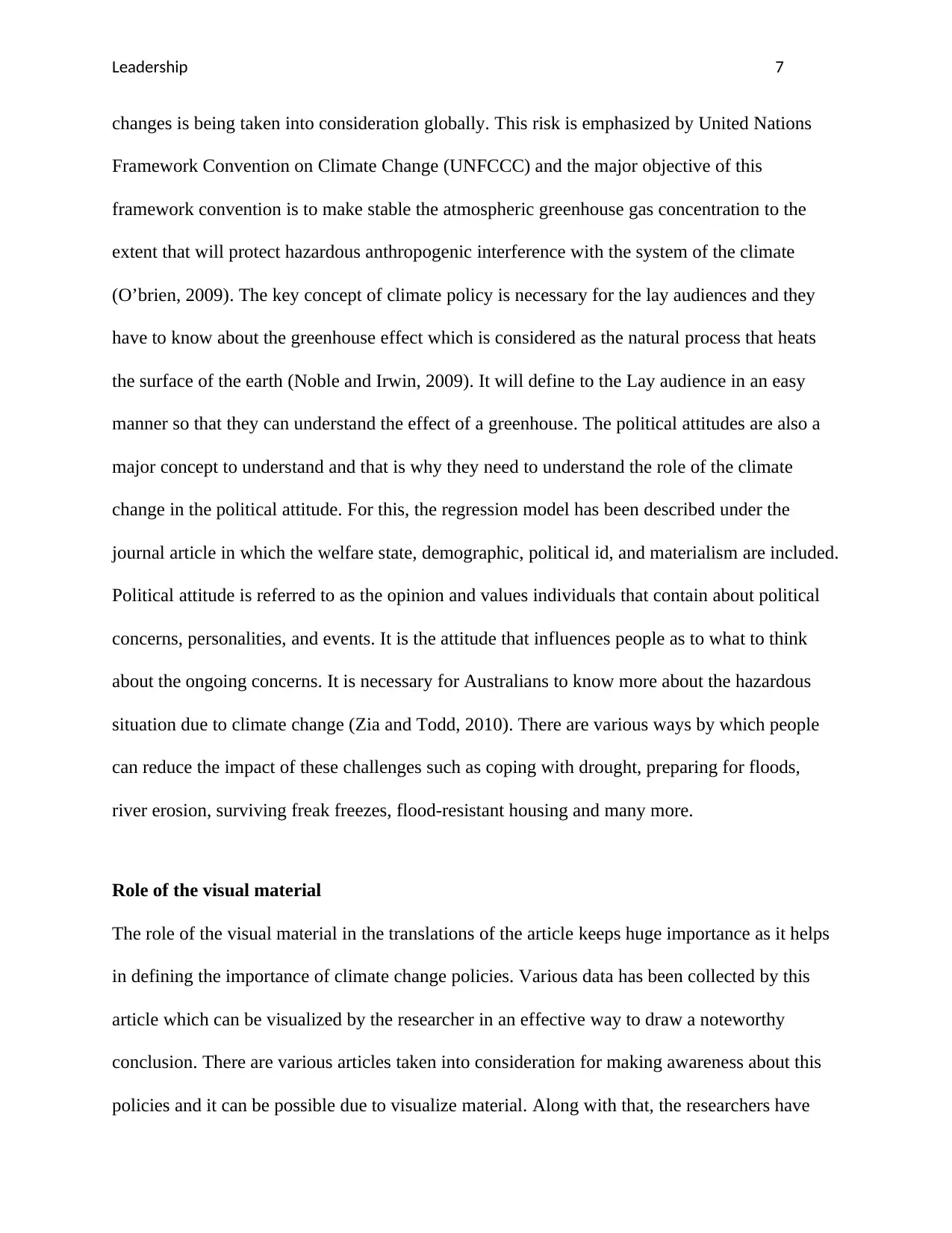
Leadership 7
changes is being taken into consideration globally. This risk is emphasized by United Nations
Framework Convention on Climate Change (UNFCCC) and the major objective of this
framework convention is to make stable the atmospheric greenhouse gas concentration to the
extent that will protect hazardous anthropogenic interference with the system of the climate
(O’brien, 2009). The key concept of climate policy is necessary for the lay audiences and they
have to know about the greenhouse effect which is considered as the natural process that heats
the surface of the earth (Noble and Irwin, 2009). It will define to the Lay audience in an easy
manner so that they can understand the effect of a greenhouse. The political attitudes are also a
major concept to understand and that is why they need to understand the role of the climate
change in the political attitude. For this, the regression model has been described under the
journal article in which the welfare state, demographic, political id, and materialism are included.
Political attitude is referred to as the opinion and values individuals that contain about political
concerns, personalities, and events. It is the attitude that influences people as to what to think
about the ongoing concerns. It is necessary for Australians to know more about the hazardous
situation due to climate change (Zia and Todd, 2010). There are various ways by which people
can reduce the impact of these challenges such as coping with drought, preparing for floods,
river erosion, surviving freak freezes, flood-resistant housing and many more.
Role of the visual material
The role of the visual material in the translations of the article keeps huge importance as it helps
in defining the importance of climate change policies. Various data has been collected by this
article which can be visualized by the researcher in an effective way to draw a noteworthy
conclusion. There are various articles taken into consideration for making awareness about this
policies and it can be possible due to visualize material. Along with that, the researchers have
changes is being taken into consideration globally. This risk is emphasized by United Nations
Framework Convention on Climate Change (UNFCCC) and the major objective of this
framework convention is to make stable the atmospheric greenhouse gas concentration to the
extent that will protect hazardous anthropogenic interference with the system of the climate
(O’brien, 2009). The key concept of climate policy is necessary for the lay audiences and they
have to know about the greenhouse effect which is considered as the natural process that heats
the surface of the earth (Noble and Irwin, 2009). It will define to the Lay audience in an easy
manner so that they can understand the effect of a greenhouse. The political attitudes are also a
major concept to understand and that is why they need to understand the role of the climate
change in the political attitude. For this, the regression model has been described under the
journal article in which the welfare state, demographic, political id, and materialism are included.
Political attitude is referred to as the opinion and values individuals that contain about political
concerns, personalities, and events. It is the attitude that influences people as to what to think
about the ongoing concerns. It is necessary for Australians to know more about the hazardous
situation due to climate change (Zia and Todd, 2010). There are various ways by which people
can reduce the impact of these challenges such as coping with drought, preparing for floods,
river erosion, surviving freak freezes, flood-resistant housing and many more.
Role of the visual material
The role of the visual material in the translations of the article keeps huge importance as it helps
in defining the importance of climate change policies. Various data has been collected by this
article which can be visualized by the researcher in an effective way to draw a noteworthy
conclusion. There are various articles taken into consideration for making awareness about this
policies and it can be possible due to visualize material. Along with that, the researchers have
Paraphrase This Document
Need a fresh take? Get an instant paraphrase of this document with our AI Paraphraser
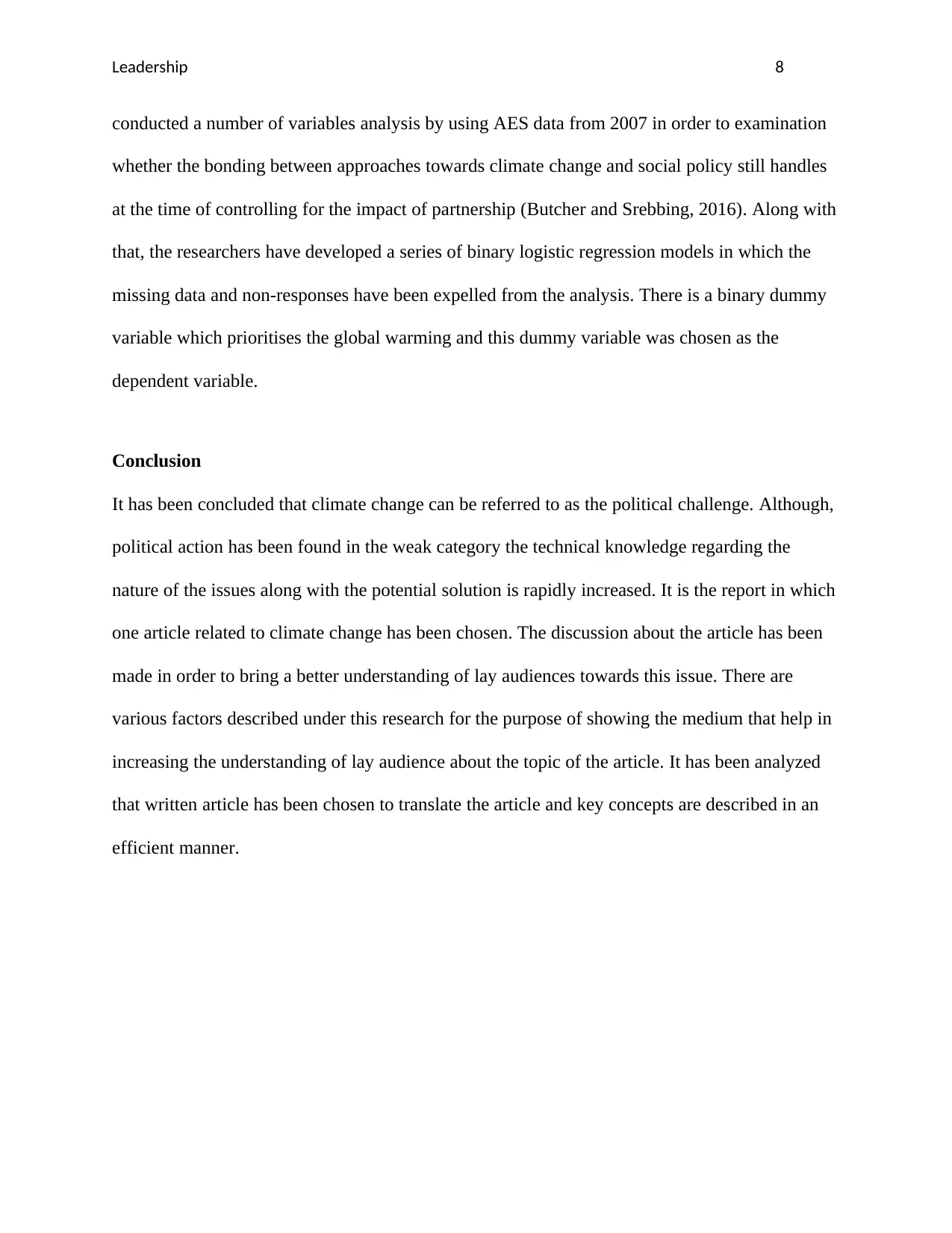
Leadership 8
conducted a number of variables analysis by using AES data from 2007 in order to examination
whether the bonding between approaches towards climate change and social policy still handles
at the time of controlling for the impact of partnership (Butcher and Srebbing, 2016). Along with
that, the researchers have developed a series of binary logistic regression models in which the
missing data and non-responses have been expelled from the analysis. There is a binary dummy
variable which prioritises the global warming and this dummy variable was chosen as the
dependent variable.
Conclusion
It has been concluded that climate change can be referred to as the political challenge. Although,
political action has been found in the weak category the technical knowledge regarding the
nature of the issues along with the potential solution is rapidly increased. It is the report in which
one article related to climate change has been chosen. The discussion about the article has been
made in order to bring a better understanding of lay audiences towards this issue. There are
various factors described under this research for the purpose of showing the medium that help in
increasing the understanding of lay audience about the topic of the article. It has been analyzed
that written article has been chosen to translate the article and key concepts are described in an
efficient manner.
conducted a number of variables analysis by using AES data from 2007 in order to examination
whether the bonding between approaches towards climate change and social policy still handles
at the time of controlling for the impact of partnership (Butcher and Srebbing, 2016). Along with
that, the researchers have developed a series of binary logistic regression models in which the
missing data and non-responses have been expelled from the analysis. There is a binary dummy
variable which prioritises the global warming and this dummy variable was chosen as the
dependent variable.
Conclusion
It has been concluded that climate change can be referred to as the political challenge. Although,
political action has been found in the weak category the technical knowledge regarding the
nature of the issues along with the potential solution is rapidly increased. It is the report in which
one article related to climate change has been chosen. The discussion about the article has been
made in order to bring a better understanding of lay audiences towards this issue. There are
various factors described under this research for the purpose of showing the medium that help in
increasing the understanding of lay audience about the topic of the article. It has been analyzed
that written article has been chosen to translate the article and key concepts are described in an
efficient manner.
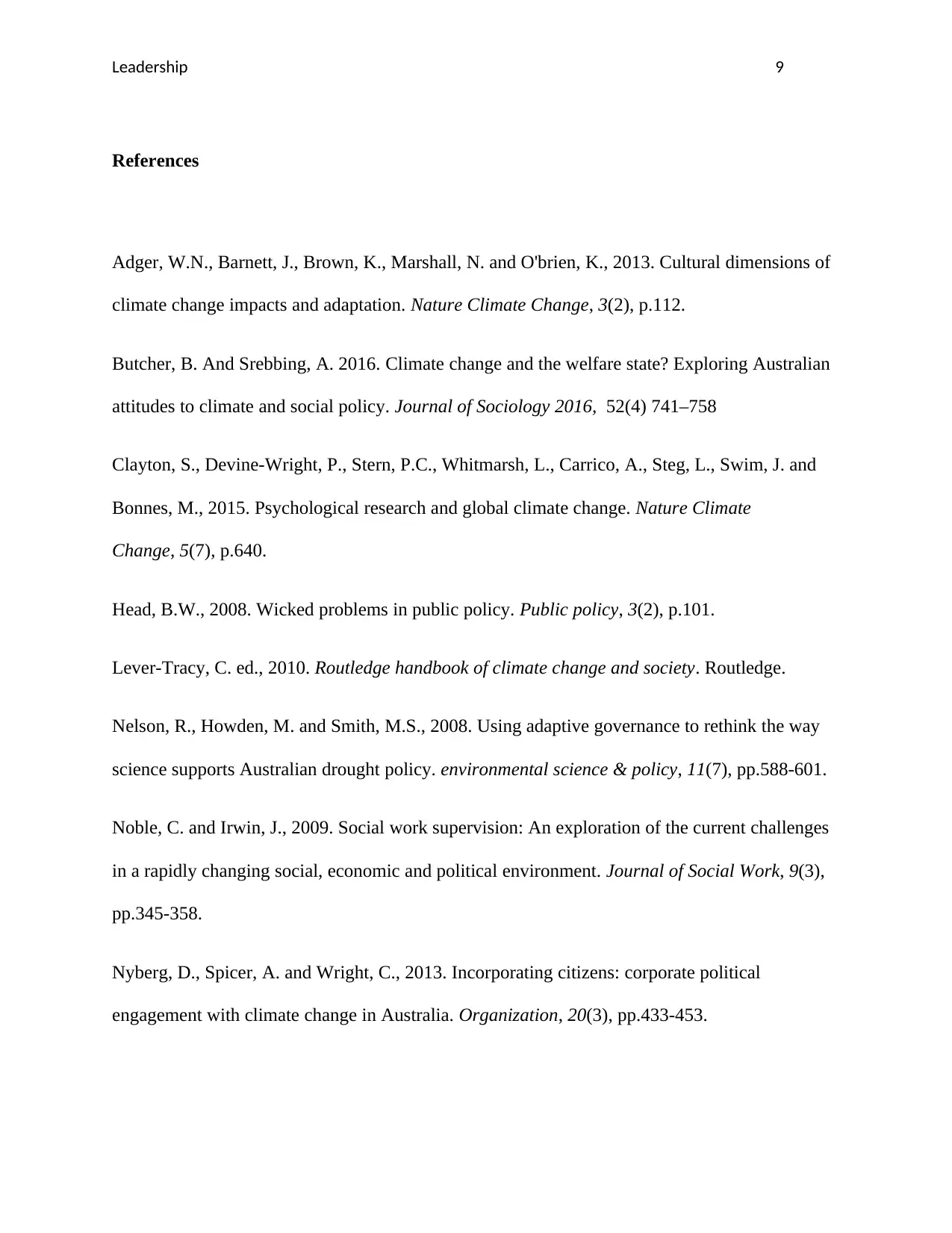
Leadership 9
References
Adger, W.N., Barnett, J., Brown, K., Marshall, N. and O'brien, K., 2013. Cultural dimensions of
climate change impacts and adaptation. Nature Climate Change, 3(2), p.112.
Butcher, B. And Srebbing, A. 2016. Climate change and the welfare state? Exploring Australian
attitudes to climate and social policy. Journal of Sociology 2016, 52(4) 741–758
Clayton, S., Devine-Wright, P., Stern, P.C., Whitmarsh, L., Carrico, A., Steg, L., Swim, J. and
Bonnes, M., 2015. Psychological research and global climate change. Nature Climate
Change, 5(7), p.640.
Head, B.W., 2008. Wicked problems in public policy. Public policy, 3(2), p.101.
Lever-Tracy, C. ed., 2010. Routledge handbook of climate change and society. Routledge.
Nelson, R., Howden, M. and Smith, M.S., 2008. Using adaptive governance to rethink the way
science supports Australian drought policy. environmental science & policy, 11(7), pp.588-601.
Noble, C. and Irwin, J., 2009. Social work supervision: An exploration of the current challenges
in a rapidly changing social, economic and political environment. Journal of Social Work, 9(3),
pp.345-358.
Nyberg, D., Spicer, A. and Wright, C., 2013. Incorporating citizens: corporate political
engagement with climate change in Australia. Organization, 20(3), pp.433-453.
References
Adger, W.N., Barnett, J., Brown, K., Marshall, N. and O'brien, K., 2013. Cultural dimensions of
climate change impacts and adaptation. Nature Climate Change, 3(2), p.112.
Butcher, B. And Srebbing, A. 2016. Climate change and the welfare state? Exploring Australian
attitudes to climate and social policy. Journal of Sociology 2016, 52(4) 741–758
Clayton, S., Devine-Wright, P., Stern, P.C., Whitmarsh, L., Carrico, A., Steg, L., Swim, J. and
Bonnes, M., 2015. Psychological research and global climate change. Nature Climate
Change, 5(7), p.640.
Head, B.W., 2008. Wicked problems in public policy. Public policy, 3(2), p.101.
Lever-Tracy, C. ed., 2010. Routledge handbook of climate change and society. Routledge.
Nelson, R., Howden, M. and Smith, M.S., 2008. Using adaptive governance to rethink the way
science supports Australian drought policy. environmental science & policy, 11(7), pp.588-601.
Noble, C. and Irwin, J., 2009. Social work supervision: An exploration of the current challenges
in a rapidly changing social, economic and political environment. Journal of Social Work, 9(3),
pp.345-358.
Nyberg, D., Spicer, A. and Wright, C., 2013. Incorporating citizens: corporate political
engagement with climate change in Australia. Organization, 20(3), pp.433-453.
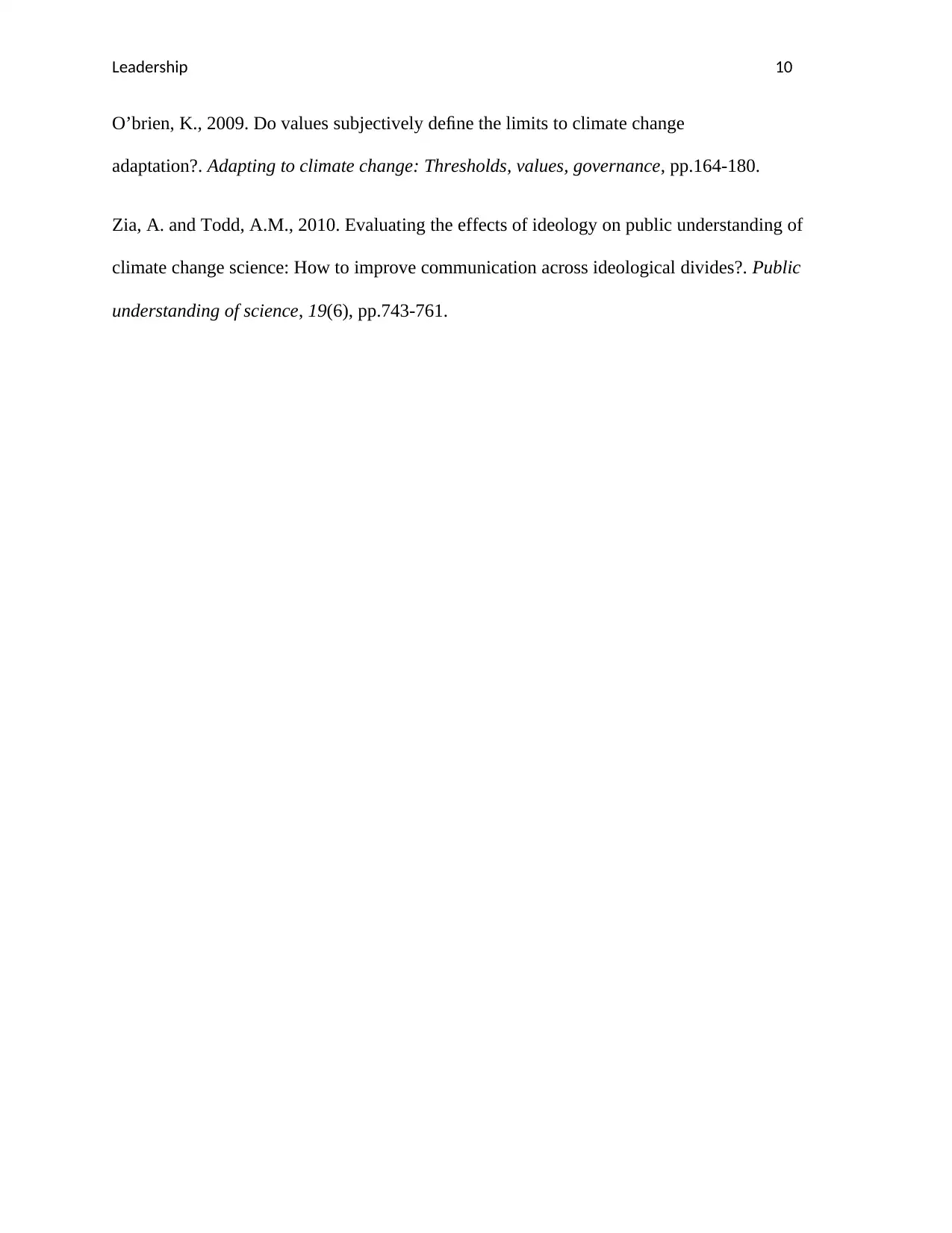
Leadership 10
O’brien, K., 2009. Do values subjectively define the limits to climate change
adaptation?. Adapting to climate change: Thresholds, values, governance, pp.164-180.
Zia, A. and Todd, A.M., 2010. Evaluating the effects of ideology on public understanding of
climate change science: How to improve communication across ideological divides?. Public
understanding of science, 19(6), pp.743-761.
O’brien, K., 2009. Do values subjectively define the limits to climate change
adaptation?. Adapting to climate change: Thresholds, values, governance, pp.164-180.
Zia, A. and Todd, A.M., 2010. Evaluating the effects of ideology on public understanding of
climate change science: How to improve communication across ideological divides?. Public
understanding of science, 19(6), pp.743-761.
1 out of 10
Related Documents
Your All-in-One AI-Powered Toolkit for Academic Success.
+13062052269
info@desklib.com
Available 24*7 on WhatsApp / Email
![[object Object]](/_next/static/media/star-bottom.7253800d.svg)
Unlock your academic potential
© 2024 | Zucol Services PVT LTD | All rights reserved.





